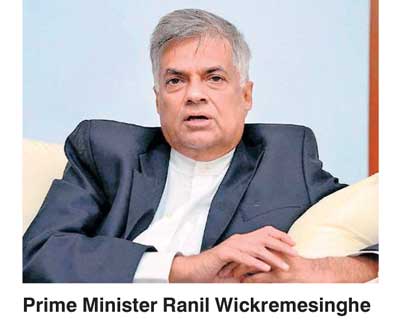Sunday Feb 22, 2026
Sunday Feb 22, 2026
Wednesday, 31 August 2016 00:01 - - {{hitsCtrl.values.hits}}
Prime Minister Ranil Wickremesinghe must be commended for renegotiating the entire Port City agreement and changing the name to Colombo International Financial City (CIFC), which gives a marketing boost for the project
In the run-up to the 2015 presidential election, there was a clear message by the Sirisena-Ranil camp that the Rajapaksa-initiated Port City Project would be halted and that Prime Minister Ranil Wickremesinghe had been particularly vocal about the way in which the project had been promoted and the callous manner in which the agreements had been executed. There were widespread concerns over environmental issues.
Ranil had never uttered a word against China nor against other projects being promoted by Chinese State-owned enterprises. His only gripe was about the Colombo Port City project which had regional security implications as was understood by the various pronouncements reported by Indian and international media over an ominous strategy called ‘encirclement of India”. The other issue was the granting of land on freehold basis which is unconstitutional and also an impeachable offence under 1978 Constitution.
Mahinda drove a wedge between China and Sri Lanka
Former President Mahinda Rajapaksa in an interview with South China Post (an influential newspaper read by Beijing’s policymakers), dated 12 March 2015, had made a very caustic comment on the Sri Lanka-China friendship. The response of the former President was typical of his ability to drive wedges not only among political parties but even with the highest order of the  Sangha in Sri Lanka.
Sangha in Sri Lanka.
He had said: “They (Maithree-Ranil) should be thankful to China for the help they extended; instead these people are treating China like a criminal. But I would urge China not to take it personally. It’s me they are after. They are only using China to get me. China should not feel hurt and stop helping Sri Lanka.” (http://www.scmp.com/news/asia/diplomacy/article/1735379/sri-lanka-should-thank-china-not-attack-it-ex-president).
If one goes by the real diplomacy between China and Sri Lanka at the time the Yahapalana Government came into power, this statement is intended to create a dent in our relations with China. President Sirisena once said that it was wrong to blame China but the previous regime for mismanaging the projects. Even Prime Minister Ranil Wickremesinghe never made any statement that would damage relations but what was at issue was the manner in which Port City was initiated. It also had obvious missives from India as the Chinese footprint was ever-increasing under the Rajapaksa watch.
India was unhappy that Rajapaksa foreign policy had completely ignored the regional security concerns of India. It also ran counter to some of the provisions of the Indo-Lanka agreement which states that Sri Lanka must not engage in any manner that would threaten the national security of India. One reason India was instrumental in defeating LTTE was its acquisition of a fleet of aircrafts which was a direct threat to national security of India as well. If the LTTE had prevailed it would have even ventured into gun running between Tamil Nadu and the Wanni jungles with ease.
The Rajapaksa administration mismanaged everything after the 2009 victory against LTTE. He donned a crown and rested on the laurels that people would venerate him for 30 years and that he could stay in power comfortably.
Lack of transparency with Rajapaksa administration
India was equally suspicious over a number of agreements signed when President of China Xi Jinping visited Sri Lanka. The contents of the signed agreements had been kept under the rose. The granting of docking facility to a Chinese submarine at the Chinese built berth sent alarm bells in Delhi. The Sunday Times (19 October 2014) had reported that Sri Lanka had granted Chinese State-owned companies operating rights to four berths at the Hambantota Port once the projects were completed. The report says there had been no tenders or prior announcements.
But former Sri Lanka Ports Authority Chairman Priyath B. Wickrama had said that the Government had agreed to such an  arrangement with the Hambantota Port’s Chinese lenders as far back as 2010. The former Chairman had said that they had an understanding with China when the Government took the loan. The loan agreement had been signed with the Treasury. He also revealed that, in exchange for these operating rights, the Chinese had consented to ease loan conditions.
arrangement with the Hambantota Port’s Chinese lenders as far back as 2010. The former Chairman had said that they had an understanding with China when the Government took the loan. The loan agreement had been signed with the Treasury. He also revealed that, in exchange for these operating rights, the Chinese had consented to ease loan conditions.
He went on to say that the loan was a ‘huge loan’. The Chinese Government has agreed to relax the loan conditions as well and the terms of the Phase I loan and Phase II loan were also being rearranged. These close interactions with China may have been seen by India as being manifestations of a strategy more in line with the popular belief that there is a strategy to “encircle” India through deals with Sri Lanka which were not transparent.
Ranil’s diplomacy and statecraft
Ranil must be commended for renegotiating the entire Port City agreement and changing the name to Colombo International Financial City (CIFC), which gives a marketing boost for the project. After all, once the project has been completed, it must be marketed abroad for investors. One could therefor safely assume that Ranil’s craft of diplomacy must have gained currency with Chinese investors. The removal of clauses on freehold rights and dilution of the compensation claims are also positive outcomes of successful negotiations.
Once the Port City project was halted by the Cabinet, a sub-committee was appointed to review all contracts. President Sirisena visited China and was well-received by the Government of China. The recent visit to China by a high-powered delegation led by Prime Minister Ranil Wickremesinghe, as Prime Minister of the ‘National Government’ not as Prime Minister of a UNP Government – accompanied by Malik Samarawickrama (UNP), Dr. Sarath Amunugama (SLFP), Nimal Siripala De Silva (SLFP), Rauff Hakeem (UNP), Mangala Samaraweera (UNP) and Sajith Premadasa (UNP).
This high-level visit epitomised Sri Lanka’s convictions that it is willing to keep intact the centuries-old good relations with China. The manner in which the entire Port City project was transformed into a tripartite agreement symbolises the professionalism with which foreign policy issues are addressed. This is undeniably ‘an ace’ in the craft of diplomacy thanks to Prime Minister Ranil Wickremesinghe. There may have been tacit diplomatic nod by the Government of India as without which Sri Lanka would not have ventured into renegotiating this port city project agreements.
One aspect of the foreign policy of the Rajapaksa administration was that it was bereft of professionalism as the diplomats had been handpicked on the basis of close family connections and that some of the career diplomats had been side-lined. This writer is yet to find a critique of the tripartite agreement by the Joint Opposition (JO) because the writer believes that JO too must have silently acquiesced with the merits of the entire negotiating process. After all China is a superpower and the Chinese attitude towards Sri Lanka was commendable, despite what Rajapaksa had told South China Post that China was being treated like ‘a criminal’.
(The writer is a political commentator and a freelance journalist. He holds an LLM in International Commercial Law and a Post Graduate Diploma in Diplomacy.)